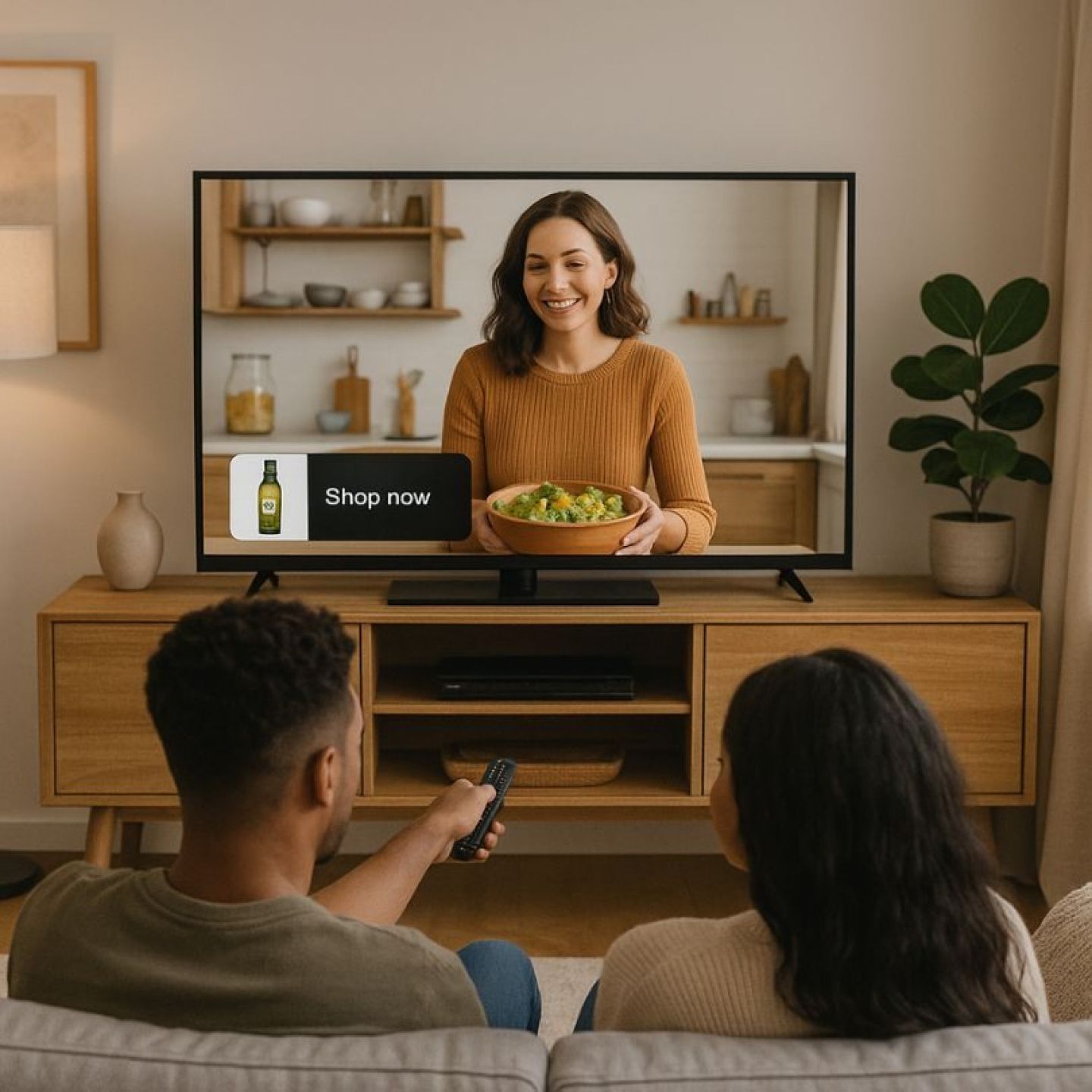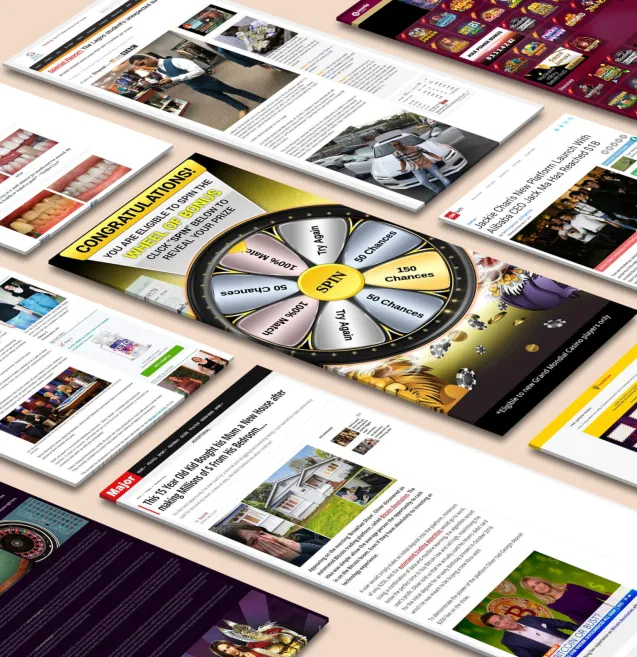
Our spy tools monitor millions of native ads from over 60+ countries and thousands of publishers.
Get StartedNative TV Is Here: CTV Overlays, Pause Ads, and Shoppable Moments are reshaping how brands connect with audiences in the streaming era. Connected TV advertising has emerged as the dominant force in modern marketing, capturing viewer attention as traditional linear television continues its decline.
The shift toward streaming platforms has created unprecedented opportunities for advertisers. You can now reach audiences through smart TVs, streaming devices, and connected apps with precision that was impossible just a few years ago. This evolution has sparked the development of revolutionary ad formats that blend seamlessly into the viewing experience.
These innovative formats represent a fundamental shift from interruptive advertising to integrated experiences. You're no longer forcing viewers to sit through irrelevant commercials—you're offering value at precisely the right moment. The technology behind native TV advertising combines the storytelling power of television with the targeting precision of digital marketing.
This transformation demands a new approach to campaign strategy. The brands that embrace these native ad experiences will capture market share while competitors struggle with outdated methods. Your advertising strategy needs to evolve with these emerging opportunities to remain competitive in the connected media landscape. This is where native retail media comes into play, transforming the way brands tell their stories within retail environments.
Native TV advertising represents a new way for brands to connect with audiences through CTV advertising platforms. Unlike traditional commercials that interrupt the content, native ad experiences seamlessly blend into the viewing environment, creating interactions that feel natural and engaging.
The foundation of effective native TV advertising rests on three core principles:
Traditional TV commercials force viewers into passive consumption during predetermined time slots. Digital display ads often rely on banner placements that compete for attention. Native TV advertising transforms this dynamic by embedding interactive opportunities directly within the content experience.
You can think of native TV ads as intelligent content layers that respond to viewer behavior. When someone pauses their show, a relevant product offer appears. During a cooking segment, clickable recipe ingredients become available for immediate purchase. These experiences feel like natural extensions of the content rather than marketing interruptions.
The key differentiator lies in viewer control. Traditional formats dictate when and how long audiences must engage with advertising messages. Native TV advertising empowers viewers to choose their level of interaction, creating positive brand associations through voluntary engagement rather than forced exposure.
Native TV Is Here: CTV Overlays, Pause Ads, and Shoppable Moments represent a fundamental shift in how brands connect with audiences through connected television. These formats break away from traditional interruption-based advertising, creating seamless experiences that respect viewer preferences while delivering measurable business results.
Shoppable moments transform passive viewing into active commerce opportunities by enabling viewers to purchase products directly from the ad experience. You can now click on a product featured in a cooking show and add ingredients to your cart without leaving your couch or missing a single moment of content.
The evolution from shoppable QR flows to integrated purchasing experiences marks a significant advancement in CTV technology. Early implementations required viewers to scan QR codes with their phones, creating friction that often resulted in abandoned purchases. Modern shoppable moments centralize the entire shopping experience within publisher tech stacks, allowing you to browse, select, and purchase using your TV remote or connected device interface.
This streamlined approach delivers substantial benefits for direct-to-consumer brands:
Interactive contextual overlays complement shoppable moments by providing additional product information, pricing details, and customer reviews without interrupting the underlying content. These contextual overlays appear strategically during relevant scenes, such as displaying furniture details when a character sits on a particular sofa or showcasing skincare products during beauty-focused programming.
The technology behind these experiences relies on sophisticated content recognition and timing algorithms that identify optimal moments for product placement. You benefit from this precision targeting because the shopping opportunities feel natural and relevant rather than forced or disruptive to your viewing experience.
DTC brands leveraging shoppable moments report conversion rates significantly higher than traditional display advertising, with some campaigns achieving double-digit improvements in purchase completion rates compared to standard e-commerce funnels.
Pause ads are a game-changer in non-intrusive engagement, appearing precisely when viewers naturally pause their content. This innovative format takes advantage of organic viewing breaks, delivering targeted messages during moments when audiences are already mentally disengaged from the main content.
The strategic positioning of pause ads eliminates the friction associated with traditional interruptive formats. When you pause your favorite show to grab a snack or answer a phone call, these ads seamlessly fill that space without forcing you to wait through predetermined ad breaks. This approach respects viewer autonomy while maintaining advertiser visibility.
Key advantages of pause ads include:
Unlike pre-roll or mid-roll advertisements that interrupt the viewing flow, pause ads work harmoniously with viewer behavior patterns. You maintain complete control over when and how long you engage with the advertising content. This user-centric approach has proven particularly effective for brands seeking to build trust while delivering their message.
The success of this format comes from its ability to align with natural viewing habits, creating advertising opportunities that feel organic rather than imposed. Pause ads demonstrate how Native TV Is Here: CTV Overlays, Pause Ads, and Shoppable Moments are reshaping the advertising landscape through viewer-first design principles.
Interactive contextual overlays represent the most sophisticated evolution in native TV advertising, delivering dynamic ad content that seamlessly integrates with your viewing experience. These overlays appear as transparent layers positioned strategically over video content, allowing you to interact with brands without pausing or interrupting your entertainment.
The functionality centers on non-intrusive engagement through carefully placed interactive elements. You might see a subtle product highlight during a cooking show, or a clickable brand logo during a sports broadcast. These contextual overlays respond to the content you're watching, making the advertising feel natural and relevant rather than forced.
Personalization drives the power behind these overlays. The system analyzes your viewing habits, preferences, and behavioral data to serve customized interactive elements. When you see a character wearing a jacket you like, a simple remote click reveals purchase options, sizing information, and instant checkout capabilities.
Engagement rates soar compared to traditional pre-roll advertisements. Interactive overlays generate 3x higher click-through rates because they appear when you're most engaged with content. The clickable elements create immediate pathways to action:
These shoppable moments transform passive viewing into active shopping experiences, creating revenue opportunities that traditional advertising formats simply cannot match.
Enhanced targeting capabilities distinguish CTV advertising from traditional broadcast television. You can leverage sophisticated audience insights and behavioral data to reach specific viewers at the individual level, moving beyond broad demographic categories. CTV platforms collect rich data sets including viewing habits, device usage patterns, purchase history, and real-time engagement metrics to create detailed audience profiles.
This granular data enables you to deliver personalized ad experiences through shoppable moments, pause ads, and interactive overlays. When a viewer shows interest in home fitness content, you can serve targeted workout equipment ads with immediate purchase options. The precision extends to timing - you can trigger shoppable moments during relevant content scenes or deploy pause ads when viewers naturally break from viewing.
Real-time optimization transforms campaign performance through continuous data feedback loops. You receive immediate insights on engagement rates, click-through performance, and conversion metrics, allowing you to adjust creative elements, targeting parameters, and budget allocation within hours rather than weeks.
Measurement realities in CTV present both opportunities and challenges. While you gain access to comprehensive engagement data unavailable in linear TV, cross-device tracking and attribution modeling require sophisticated solutions. Privacy regulations and walled garden platforms create measurement gaps that demand innovative approaches.
You can address these challenges by implementing unified measurement frameworks that combine first-party data with platform-specific metrics, ensuring accurate ROI calculations across your Native TV Is Here: CTV Overlays, Pause Ads, and Shoppable Moments campaigns.
Creative best practices for native TV advertising require a delicate balance between entertainment value and commercial effectiveness. You need to craft content that feels natural within the viewing environment while driving meaningful consumer action.
Immersive storytelling forms the foundation of successful native TV ads. Your creative should seamlessly blend with the content experience, using authentic narratives that resonate with your target audience's interests and viewing context. Consider how your brand story unfolds within the specific platform environment - whether it's a lifestyle brand showcasing products during a cooking show overlay or a fitness brand appearing during sports content pauses.
When designing shoppable moments, you must balance visual appeal with functional clarity. Your call-to-action elements should be:
Interactive overlays demand particular attention to timing and placement. You want to capture viewer attention during natural engagement peaks while avoiding content obstruction.
Maintaining viewer trust requires transparent yet unobtrusive disclosure practices. Your sponsored content labels should be clearly visible without disrupting the creative flow. Use consistent disclosure language across all native formats, positioning these elements where viewers naturally expect to find them. This approach preserves ad effectiveness while meeting regulatory requirements and building long-term audience trust.
Native TV Is Here: CTV Overlays represent just the beginning of a massive market transformation. CTV advertising spend is experiencing unprecedented growth across key global markets, with projections showing the US market reaching $25.1 billion by 2026, while the UK expects to see 40% year-over-year growth through 2025. India's CTV advertising landscape presents even more dramatic expansion, with smart TV adoption accelerating at rates exceeding 60% annually.
The cord-cutting phenomenon drives this explosive market growth as consumers abandon traditional cable subscriptions in favor of streaming services. You're witnessing millions of households making this transition monthly, creating vast new advertising inventory opportunities. Smart TV penetration now exceeds 70% in developed markets, with emerging economies following rapidly.
Platform diversity creates unprecedented opportunities for advertisers seeking comprehensive reach:
Each platform brings unique audience segments and engagement patterns. You can now craft tailored strategies that leverage specific platform strengths - from YouTube's search integration to Samsung's device-level targeting capabilities. This platform diversity enables you to reach cord-cutters across their preferred viewing environments while maintaining consistent brand messaging through native ad formats.
Native TV Is Here: CTV Overlays, Pause Ads, and Shoppable Moments are reshaping how you approach campaign development. The key to success lies in strategic implementation that maximizes each format's unique strengths.
Start by auditing your existing creative assets to identify products or services that translate well to immediate purchase decisions. Your current video content can serve as the foundation for shoppable moment integration:
You can transform ad strategy by layering multiple formats strategically. Combine pause ads with contextual overlays to create seamless viewer journeys. When viewers pause content, present relevant product information through overlays that complement your main campaign messaging.
Interactive overlays work particularly well when synchronized with shoppable moments, allowing viewers to explore product details before committing to purchase.
Track performance through dual-metric approaches:
You'll want to establish baseline performance from traditional CTV campaigns before implementing shoppable features. This comparison reveals the true impact of interactive elements on your campaign effectiveness and helps optimize future creative decisions.
The connected media ecosystem is rapidly transforming how brands engage with audiences. Native TV Is Here: CTV Overlays, Pause Ads, and Shoppable Moments represent just the beginning of this evolution. You need to embrace these innovative interactive formats to maintain your competitive edge in an increasingly crowded marketplace.
The native TV advertising future demands a strategic shift from traditional broadcast thinking to digital-first approaches. Smart brands are already integrating shoppable moments, pause ads, and interactive overlays into their core advertising strategies rather than treating them as experimental add-ons.
Your success depends on adopting creative best practices that align with measurement realities. The growing connected media ecosystem rewards advertisers who understand that viewer engagement metrics and conversion tracking provide clearer ROI insights than traditional TV metrics ever could.
The brands that thrive will be those that recognize native TV advertising isn't just another channel—it's a fundamental reimagining of how television advertising works. You have the tools and technology available today to transform your ad strategy and capture audience attention in ways that were impossible just a few years ago.
Receive top converting landing pages in your inbox every week from us.
Must Read
Stay ahead of upcoming regulations with this essential native ads compliance and policy checklist for 2026. Learn how to align your campaigns with new advertising standards while maintaining transparency and performance. Discover key updates in disclosure rules, data usage, and creative best practices. Perfect for advertisers preparing their strategies early to ensure smooth, compliant campaigns in the new year.
Dan Smith
7 minDec 21, 2025
How-To
Native ads can do more than drive clicks—they can build long-term brand loyalty. Learn how to use authentic storytelling, strategic placement, and audience targeting to strengthen trust during year-end campaigns. Discover how subtle, value-driven messaging keeps customers engaged beyond the holidays. Ideal for marketers aiming to turn seasonal buyers into loyal brand advocates.
Marcus Chen
7 minDec 15, 2025
Must Read
As third-party cookies fade away, contextual targeting is making a powerful comeback. Learn how to leverage native ads that align with user intent and content relevance to maintain high engagement and conversions. Discover modern tools and tactics that make cookie-free targeting both precise and scalable. Ideal for advertisers seeking privacy-friendly ways to drive performance in 2025 and beyond.
Liam O’Connor
7 minDec 9, 2025




